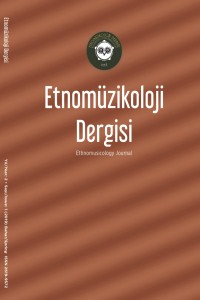Abstract
It is proposed to study the work of the Brazilian black priest José Maurício Nunes Garcia (1767-1830), considered the greatest national composer of the Colonial Period, from the perspective of the hegemony of Europeanism - of European music that dominated all three phases, mainly Germanic and Italian. From this perspective, one can see how the structure of his work was developed, and with the methodology of Ethnomusicology, it could be considered that it is mostly oriented as a direct importation of Euro- peanism from the XVIII and XIX Centuries, and almost nothing has of Brazilian. This is partly due to his own humble and black origin - grandson of slaves - he had to completely subordinate himself to the will of his hier- archical superiors, both of the Church and of the Royal Court of Rio de Janeiro.
Keywords
References
- Andrade, M. (2006) Música, doce música (3th ed.). Brazil: Itatiaia.
- Biography of Padre José Mauricio Nunes Garcia [1897]. Brazil: unknown. Figueiredo, C. A. (2012). In Dicionário Biográfico Caravelas Núcleo de Estudos da História da Música Luso-Brasileira. Retrieved from http://www.caravelas.com.pt/dicionario_biografico_caravelas.html.
- Freyre, G. (2016) Casa-Grande e senzala (51th ed.). Brazil: Global.
- Garcia, J. M. N. (1837) Beijo a mão que me condena. Unknown place: Pierre FlfForge.
- Garcia, J. M. N. (1897) Missa de requiem: Reduzida para órgão ou harmonium por Alberto Nepomuceno. Brazil: Bevilacqua.
- Garcia, J. M. N. (1994). Requiem in d. Germany: Verlag.
- The Hegemony of Europeanism in The Work of José Maurício Nunes Garcia 127
- Heitor, L. (1930, unknown month). O espírito religioso na obra de José Mau- rício. Ilustração Musical, 3, 75-78.
- Holanda, S. (2016) Raízes do Brasil (27th ed.) Brazil: Companhia das Letras. Lanzelotti, date unknown. Portrait made by José Maurício Nunes Garcia Jr. Public Domain.
- Mattos, C. (1997) José Maurício Nunes Garcia: Biografia. Brazil: Biblioteca Nacional.
- Mozart, W. A. (1987). Requiem. Toronto: Dover.
- Oliveira, A. (2008). Suplicando a ‘dispensa do defeito da cor’: clero secular e estratégias de mobilidade social no Bispado do Rio de Janeiro. s. XVIII. History Meeting in Anpuh Rio,13, 1 -8.
- Ribeiro, D. (1995) O povo brasileiro: a formação e o sentido do Brasil. Brazil:Global.
- Schönberg, A. (1990). Fundamentos da composição musical. Translation: Eduardo Seincman. São Paulo: São Paulo University.
- Taunay, V. (1930). Dous artistas maximos: José Mauricio e Carlos Gomes. São Paulo: Melhoramentos.
- Taunay, V. (1930). Uma grande glória brasileira José Maurício Nunes Garcia. São Paulo: Melhoramentos.
- Vaccari, P. R. (2018). Padre José Maurício Nunes Garcia e o mulatismo musical: embranquecimento histórico? Música Magazine from University of São Paulo, 18, 170-85.
Abstract
It is proposed to study the work of the Brazilian black priest José Maurício Nunes Garcia (1767-1830), considered the greatest national composer of the Colonial Period, from the perspective of the hegemony of Europeanism - of European music that dominated all three phases, mainly Germanic and Italian. From this perspective, one can see how the structure of his work was developed, and with the methodology of Ethnomusicology, it could be considered that it is mostly oriented as a direct importation of Euro- peanism from the XVIII and XIX Centuries, and almost nothing has of Brazilian. This is partly due to his own humble and black origin - grandson of slaves - he had to completely subordinate himself to the will of his hier- archical superiors, both of the Church and of the Royal Court of Rio de Janeiro.
References
- Andrade, M. (2006) Música, doce música (3th ed.). Brazil: Itatiaia.
- Biography of Padre José Mauricio Nunes Garcia [1897]. Brazil: unknown. Figueiredo, C. A. (2012). In Dicionário Biográfico Caravelas Núcleo de Estudos da História da Música Luso-Brasileira. Retrieved from http://www.caravelas.com.pt/dicionario_biografico_caravelas.html.
- Freyre, G. (2016) Casa-Grande e senzala (51th ed.). Brazil: Global.
- Garcia, J. M. N. (1837) Beijo a mão que me condena. Unknown place: Pierre FlfForge.
- Garcia, J. M. N. (1897) Missa de requiem: Reduzida para órgão ou harmonium por Alberto Nepomuceno. Brazil: Bevilacqua.
- Garcia, J. M. N. (1994). Requiem in d. Germany: Verlag.
- The Hegemony of Europeanism in The Work of José Maurício Nunes Garcia 127
- Heitor, L. (1930, unknown month). O espírito religioso na obra de José Mau- rício. Ilustração Musical, 3, 75-78.
- Holanda, S. (2016) Raízes do Brasil (27th ed.) Brazil: Companhia das Letras. Lanzelotti, date unknown. Portrait made by José Maurício Nunes Garcia Jr. Public Domain.
- Mattos, C. (1997) José Maurício Nunes Garcia: Biografia. Brazil: Biblioteca Nacional.
- Mozart, W. A. (1987). Requiem. Toronto: Dover.
- Oliveira, A. (2008). Suplicando a ‘dispensa do defeito da cor’: clero secular e estratégias de mobilidade social no Bispado do Rio de Janeiro. s. XVIII. History Meeting in Anpuh Rio,13, 1 -8.
- Ribeiro, D. (1995) O povo brasileiro: a formação e o sentido do Brasil. Brazil:Global.
- Schönberg, A. (1990). Fundamentos da composição musical. Translation: Eduardo Seincman. São Paulo: São Paulo University.
- Taunay, V. (1930). Dous artistas maximos: José Mauricio e Carlos Gomes. São Paulo: Melhoramentos.
- Taunay, V. (1930). Uma grande glória brasileira José Maurício Nunes Garcia. São Paulo: Melhoramentos.
- Vaccari, P. R. (2018). Padre José Maurício Nunes Garcia e o mulatismo musical: embranquecimento histórico? Música Magazine from University of São Paulo, 18, 170-85.
Details
| Primary Language | English |
|---|---|
| Journal Section | Research Articles |
| Authors | |
| Publication Date | March 30, 2019 |
| Submission Date | January 15, 2019 |
| Published in Issue | Year 2019 Issue: 1 |

